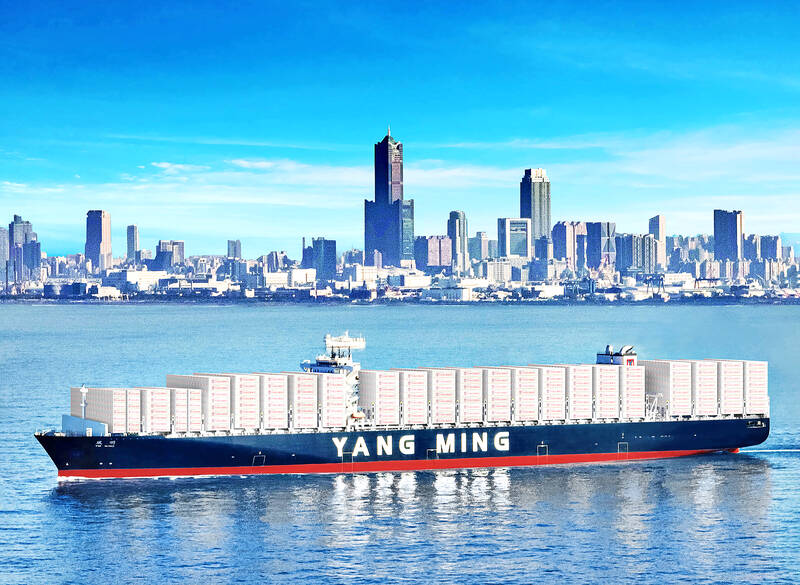Uncertainties remain for the global shipping market next quarter, even though freight rates on the main east-west routes have stopped declining this quarter, Yang Ming Marine Transport Corp (陽明海運) told an online investors’ conference yesterday.
“The global market is still affected by high inflation, overcapacity and interest rate hikes, while the issue of supply-demand imbalance remains,” Yang Ming Marine Transport said in a document released after the conference.
Citing forecasts made last month by maritime research consultancies Drewry, Alphaliner and Clarksons, it said that “supply will exceed demand from this year to next year.”

Photo courtesy of Yang Ming Marine Transport Corp
Other challenges included China’s weak export performance, and the US and European markets entering their slow season next quarter, said the company, which is the nation’s second-largest container shipper by fleet size.
A count this month showed that Yang Ming Marine Transport has 93 vessels in its fleet with a combined capacity of 705,614 twenty-foot equivalent units (TEUs), making it the world’s ninth-largest container shipper.
Shipping companies had a windfall in the past two years thanks to a surge in demand for consumer goods and freight rates during the COVID-19 pandemic, but demand has waned this year, leading to a slump in global shipping.
Yang Ming Marine Transport reported cumulative revenue of NT$95.69 billion (US$2.99 billion) in the first eight months of this year, down 66.77 percent from the same period last year.
Net profit in the first half plunged to NT$3.27 billion from NT$116.11 billion in the first half of last year, company data showed.
Earnings per share were NT$0.94 in the first half, compared with NT$33.25 a year earlier, the data showed.
While cargo volume has increased this quarter compared with the first half, European and American routes are not as robust as in previous peak quarters, which the company attributed to a slowing global economy and the still-weak recovery in demand.
Consumption during holiday shopping seasons in Europe and the US is key to the industry, Yang Ming Marine Transport said, adding that strong sales over Thanksgiving in the US and Christmas would help reduce inventory and might lead to a rebound in cargo volumes.
Yang Ming Marine Transport said that it does not have a clear picture about its business prospects for next year.
Although some other shippers are to receive new vessels next year, Yang Ming Marine Transport said its shipping capacity and route deployment would not change much next year, adding that it plans to acquire new vessels in 2026.

Taiwan Semiconductor Manufacturing Co (TSMC, 台積電) would not produce its most advanced technologies in the US next year, Minister of Economic Affairs J.W. Kuo (郭智輝) said yesterday. Kuo made the comment during an appearance at the legislature, hours after the chipmaker announced that it would invest an additional US$100 billion to expand its manufacturing operations in the US. Asked by Taiwan People’s Party Legislator-at-large Chang Chi-kai (張啟楷) if TSMC would allow its most advanced technologies, the yet-to-be-released 2-nanometer and 1.6-nanometer processes, to go to the US in the near term, Kuo denied it. TSMC recently opened its first US factory, which produces 4-nanometer

GREAT SUCCESS: Republican Senator Todd Young expressed surprise at Trump’s comments and said he expects the administration to keep the program running US lawmakers who helped secure billions of dollars in subsidies for domestic semiconductor manufacturing rejected US President Donald Trump’s call to revoke the 2022 CHIPS and Science Act, signaling that any repeal effort in the US Congress would fall short. US Senate Minority Leader Chuck Schumer, who negotiated the law, on Wednesday said that Trump’s demand would fail, while a top Republican proponent, US Senator Todd Young, expressed surprise at the president’s comments and said he expects the administration to keep the program running. The CHIPS Act is “essential for America leading the world in tech, leading the world in AI [artificial

REACTIONS: While most analysts were positive about TSMC’s investment, one said the US expansion could disrupt the company’s supply-demand balance Taiwan Semiconductor Manufacturing Co’s (TSMC, 台積電) new US$100 billion investment in the US would exert a positive effect on the chipmaker’s revenue in the medium term on the back of booming artificial intelligence (AI) chip demand from US chip designers, an International Data Corp (IDC) analyst said yesterday. “This is good for TSMC in terms of business expansion, as its major clients for advanced chips are US chip designers,” IDC senior semiconductor research manager Galen Zeng (曾冠瑋) said by telephone yesterday. “Besides, those US companies all consider supply chain resilience a business imperative,” Zeng said. That meant local supply would

BIG INVESTMENT: Hon Hai is building the world’s largest assembly plant for servers based on Nvidia Corp’s state-of-the-art AI chips, Jalisco Governor Pablo Lemus said The construction of Hon Hai Precision Industry Co’s (鴻海精密) massive artificial intelligence (AI) server plant near Guadalajara, Mexico, would be completed in a year despite the threat of new tariffs from US President Donald Trump, Jalisco Governor Pablo Lemus said. Hon Hai, also known as Foxconn Technology Group (富士康科技集團), is investing about US$900 million in what would become the world’s largest assembly plant for servers based on Nvidia Corp’s state-of-the-art GB200 AI chips, Lemus said. The project consists of two phases: the expansion of an existing Hon Hai facility in the municipality of El Salto, and the construction of a